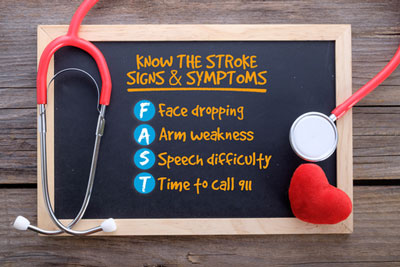Americans today can expect to live longer than ever before. Addressing family medical history and common medical conditions associated with old age early are key to maintaining our health as we navigate our senior years. Many health concerns for seniors can be prevented, or the progression slowed, by making smart, healthy, informed choices, and visiting the doctor for regular screenings.
In this article, we will address three of the most common medical conditions associated with old age, and how you or someone you love can address these conditions proactively as we age.
High Blood Pressure and Dementia
High blood pressure is a common condition in which the long-term force of the blood against your artery walls is high enough that it may eventually cause health problems, such as heart disease.
Dementia is a broad description that includes many different symptoms, including memory loss, word-finding difficulties, impaired judgment, and problems with day-to-day activities, which are caused by injury or loss of brain cells.
Why It’s a Concern
High blood pressure damages the blood vessels of the brain and leads to hardening of the arteries. It also affects tiny blood vessels and the brain’s ability to control blood flow, which is essential in keeping the brain working properly.

Learn more about how high blood pressure may increase the risk of dementia.
Managing blood pressure should be a priority for everyone because high blood pressure can put stress on the brain, heart, and kidneys. Managing blood pressure is vital to maintain overall health.
What You Can Do About It
- Control your blood pressure. Dementia typically begins in the mid-sixties. Controlling high blood pressure when you are in your mid-fifties could be key to slowing down or preventing dementia.
- Exercise, eat healthy and limit alcohol. Maintain a healthy weight, exercise, eat a diet high in vegetables, fruits, and fiber and low in salt and fat. Limit alcohol to two drinks a day for men and one a day for women.
If these measures are not successful, a doctor can prescribe medication.
Stroke
A stroke is a sudden interruption in the brain’s blood supply. Most strokes are caused when the arteries leading to the brain are abruptly blocked. Other strokes are caused by bleeding into brain tissue when a blood vessel bursts.
Why It’s a Concern
A stroke is always an emergency. While only one in five victims die from a stroke, most survivors have long-lasted physical and mental effects, so immediate medical attention is crucial.
What You Can Do About It
Don’t delay if you or someone else experiences signs of a stroke. It is better to seek immediate medical attention and be mistaken rather than the wait; strokes can cause long-lasting physical and mental complications, permanent disability, or death.
1.Familiarize yourself with signs of a stroke. Knowing the signs of a stroke will allow you to act quickly and seek medical attention when necessary.
- Numbness – The most common initial symptom is sudden numbness in the face. Those suffering a stroke may also lose feeling in their hands, feet, arms, legs, or on one entire side of the body while the other side remains fully functional. Any numbness in the body, no matter how small the area, may be considered a sign of stroke.
- Mental Confusion and Difficulty Speaking – Because a stroke affects the brain, many people will experience mental confusion as a symptom. This may manifest as difficulty speaking, possibly with incoherent speech or incorrect word usage. Speech patterns are often slurred. The person may also have trouble understanding the situation or have no memory of the last few moments.
- Loss of Sight – Complete loss of sight may occur, and many people experience limited vision as a stroke symptom. Vision may be blurry, or the person may squint to see. Double vision and inability to understand images are also common signs.
- Headache – A sudden headache, especially a severe one, can be a sign of stroke. This is especially telling if a headache has no known cause and the person has no history of headaches, although any headache may possibly be stroke-related, especially if combined with other symptoms.
- Loss of Balance and Coordination – Stroke victims often have difficulty standing, walking, or moving. The person may simply appear clumsy for no apparent reason.
2. When in doubt, conduct these F.A.S.T. tests. If you are ever unsure whether a person is experiencing the signs of a stroke, there are a few tests you can conduct. The American Heart Association uses the acronym ‘F.A.S.T.’ to make these tests easy to remember in any emergency.

- F: Face Drooping – First, ask the person to smile. If one side of their face seems to droop or feels numb, they may be having a stroke.
- A: Arm Weakness – Ask the individual to raise both arms over their head. If they have trouble due to muscle weakness or one arm seems to droop, these are strong signs of a stroke.
- S: Speech Difficulty – Ask the person to repeat a simple sentence, such as their name or a comment on the weather. If they have trouble repeating or remembering the words, or if the speech is slurred or nonsensical, call 911.
- T: Time to Call 911 – If the patient has trouble completing any of these tests or they’re experiencing the symptoms above or other unusual signs, call 911. It’s always best to err on the side of caution, even if you’re not sure the person is having a stroke. Strokes can have lasting negative effects, and immediate medical care is a necessity.
Learn more about recognizing the signs of stroke.
Difficulty Swallowing
Learn more about help for swallowing difficulties.
Difficulty swallowing is known as dysphagia. Dysphagia is usually caused by diseases or damage to your brain or nerves. Those diagnosed with stroke, brain injury, Parkinson’s disease, multiple sclerosis, Alzheimer’s disease, dementia, amyotrophic lateral sclerosis (ALS), head/neck cancer, and injuries or surgeries to the head or neck may experience problems swallowing.
There are certain signs and symptoms to watch for when you or someone else has difficulty swallowing, such as:
- Coughing when eating or drinking
- A wet or “gurgly” voice during or after eating/drinking
- Extra effort or time needed to chew or swallow food
- Liquid leaking from the mouth or getting stuck in the mouth
- Recurring pneumonia or chest congestion after eating
- Weight loss or dehydration from not being able to eat enough
- Feeling like food is stuck in your throat
It is important to pay attention to these signs and symptoms. Dysphagia can cause someone to easily choke or can cause food or liquid to go into the lungs, which can lead to pneumonia and other breathing problems.
Why It’s a Concern
Eating and drinking are vital parts of our everyday lives. They provide essential nutrition and hydration, and they’re activities we enjoy with friends and family.
What You Can Do About It
The prognosis for dysphagia varies with each individual and depends on several factors, including age, overall health, and the cause of the dysphagia. With early evaluation and proper treatment, many people experience a significant decrease of symptoms and their ability to swallow can improve.
- Consult a healthcare professional – If you or someone you know is experiencing difficulty swallowing, consult your healthcare provider, who may refer you to a Speech-Language Pathologist (SLP) or Speech Therapist who works with people having swallowing problems.
- Have an evaluation – Once an exam is ordered by a physician, an SLP will make an assessment and may perform special tests to see inside their throat when they swallow.
- Follow recommended advice – After the evaluation is completed, a SLP may work to help strengthen the muscles used for swallowing. An SLP may also recommend diet texture modifications to swallow more easily as well as positions or strategies to help with swallow safety.
Other Health Challenges for Seniors
In addition to more commonly known issues, including cognitive decline, cancer, and arthritis, there are other medical concerns we face as we age, including:
- Oral Health Issues – Healthy teeth and gums are important. Issues such as gingivitis can lead to periodontitis, a bacterial infection that affects the gums and bones supporting the teeth. Proper oral health care, including regular dental checkups, can help ensure healthy teeth and gums.
- Fragile Bones – Maintaining your balance and mobility is key in fall prevention. Falls can be especially dangerous if you have osteoporosis, where your bones become less dense and more prone to breaks and fractures. One way to keep your bones stronger is to eat lots of fruits, vegetables, and foods high in calcium.
- Influenza and Pneumonia – With immune systems that aren’t quite as robust as they used to be, seniors are more vulnerable to these illnesses. A yearly flu vaccination is extremely important. Also, ask your healthcare professional if they recommend getting the pneumonia vaccine.
- Weight Gain – As we age, we typically become less active, our metabolism slows down, and our body naturally lose muscle. As weight increases, so does the risk for disease. Ask your doctor how you might fight weight gain and stay healthy.
- Depression – Depression can lower immunity and compromise a person’s ability to fight infections. Medication and psychotherapy can help treat depression – as can seeking out ways to connect with others, including socializing, taking classes, and volunteering.
Navigating Multiple Health Issues
Often, older adults face more than one health issue at a time, and it can become a challenge to effectively treat all the conditions.
- Make sure you get all the information you need to help treat yourself or your loved one.
- Keep lines of communication open with healthcare providers.
- Work with your medical professional to find a treatment plan that works for you and your lifestyle.
Take good care of yourself and other seniors close to you and seek medical advice regularly – immediately if you have any pressing concerns.
For older adults experiencing escalating and difficult-to-manage health issues, daily assistance and skilled, compassionate care may benefit your quality of life immensely. SALMON Health and Retirement offers many levels of service in their full Continuum of Care and is here if you need us. Contact Us here if you have any questions.




